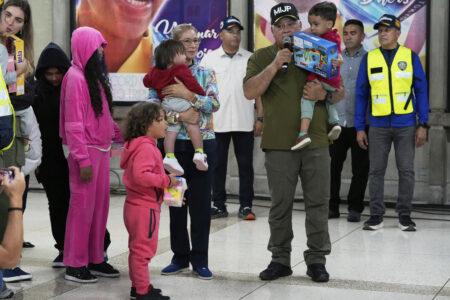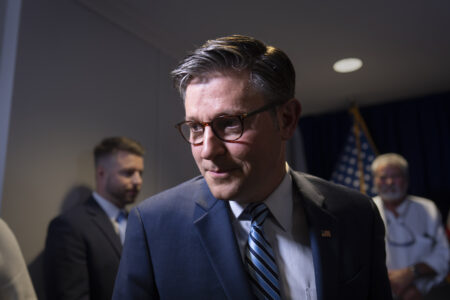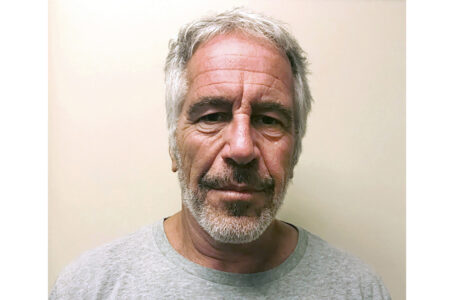Fri. 8:34 a.m.: Latest world virus headlines —Thailand bans public gatherings to stop spread

Britain's Health Secretary Matt Hancock and NHS staff stand on marks on the ground, put in place to ensure social distancing guidelines are adhered to, ahead of the opening of the NHS Nightingale Hospital today at the ExCel centre in London. The ExCel centre which has been converted into a 4,000 bed temporary hospital NHS Nightingale amid the growing coronavirus outbreak. (Stefan Rousseau/Pool Photo via AP)
Here are summaries of the latest worldwide stories on the coronavirus pandemic, including:
• Slovakia reaches deal with banks to impose moratoriums on mortgages and loans.
• Thailand bans public gatherings to stop the spread of the new coronavirus.
• European medical workers strain to save thousands of desperately ill coronavirus patients.
• Prince Charles opens temporary hospital in London.
___
BRATISLAVA, Slovakia — Slovakia’s government has reached an agreement with the country’s banks on imposing moratoriums on mortgages and loans to help households and businesses amid the the coronavirus pandemic.
Prime Minister Igor Matovic says the deal makes private individuals, self-employed people and small and middle size companies with up to 250 employees eligible to delay payments by up to nine months.
The government has asked people to only use the delay if they need it. The program is free.
Slovakia has 450 positive tests for the coronavirus.
___
BANGKOK — Thailand has banned all public gatherings to stop the spread of the new coronavirus.
The order signed today by Chief of Defense Forces Gen. Pornpipat Benyasri prohibits people from public gatherings, carrying out activities, or gathering for unlawful purposes in a manner that risks spreading the coronavirus.
It also bans any act that aggravates people’s suffering and pranks to spread the virus. That’s an apparent reference to anti-social actions such as spreading saliva on elevator buttons.
Family gatherings at residences and civic activities carried out according to safe social distancing guidelines are allowed.
Violation of the order carried a maximum penalty of two years imprisonment and a fine of 40,000 baht ($1,213).
A nationwide begins at 10 p.m. today.
___
BERLIN — Germany’s auto industry association says new car registrations in the country dropped 38 percent in March compared with a year earlier. It is the steepest drop it has measured since German reunification three decades ago.
Restrictions on public life in Germany kicked in in mid-March and automakers have largely suspended production. The association says production was down 37 percent in March to 287,900 and the number of cars exported dropped 32 percent to 234,500.
___
LONDON — Prince Charles has formally opened the new Nightingale Hospital at London’s main exhibition and conference center.
Charles launched the temporary facility at the ExCel center in east London via video link from his Scottish home of Birkhall and paid tribute to everyone involved in its construction, which took just nine days.
The heir to the U.K. throne said he was “enormously touched” to be asked to open the hospital that will rise from a capacity of 500 beds to an eventual 4,000.
Charles earlier this week emerged from self-isolation after testing positive for COVID-19 said he was lucky to only mild symptoms.
He says he hopes the hospital named after Florence Nightingale is only need for a short a time and as few people as possible.
___
COLOMBO, Sri Lanka — Sri Lanka’s national carrier says it will slash staff pay and negotiate deferred payment plans and deductions with key suppliers in it’s efforts to preserve the airline’s liquidity.
SriLankan Airlines faces a grave crisis due to COVID-19. The state-run airline says it will also implement a mandatory salary reduction of 25 percent for three months and will freeze all salary increments in 2020.
The airline is temporarily terminating operations from April 07 to April 21 with the exception of cargo services.
___
RIGA, Latvia — Latvian health authorities confirmed the first death linked to COVID-19 in the Baltic nation. The fatality was a 99-year-old woman being treated in an intensive care unit at a hospital in the capital of Riga.
Public broadcaster Latvian Television says it is not clear how the woman was infected but she had been in a chronic condition for a period of time.
Latvia is a nation of nearly 2 million and has now reported 493 coronavirus cases.___
LONDON — Google has started releasing location data to help public health officials track how people are responding to lockdowns during the coronavirus pandemic.
The U.S. tech giant said today that it’s publishing aggregated, anonymized data for 131 countries and regions to highlight movement trends over time.
The information is gathered from Google Maps or the search giant’s other services, but no personal details, such as an individual’s location, contacts or movement, is disclosed. Google plans to update the reports regularly, with a lag of two to three days.
The reports chart whether more or less people are flowing into shops, parks, grocery stores, pharmacies, subway stations and offices. The company said it has heard from health officials who say the readings could be helpful for making critical decisions on how to fight the virus.
For example, “persistent visits to transportation hubs might indicate the need to add additional buses or trains in order to allow people who need to travel room to spread out for social distancing,” Google said.
___
THE HAGUE, Netherlands — The European Union’s police agency is warning that the proliferation in people working online from home or killing time in isolation by trawling the internet during the coronavirus crisis is potentially opening the door to cybercriminals.
Executive Director of Europol Catherine De Bolle says in a report published today, “This pandemic brings out the best but unfortunately also the worst in humanity.”
She warned in particular about criminals preying on children, saying: “I am very concerned about the rise of child sexual abuse online.”
Europol, based in The Hague, Netherlands, says some of its member states, including Spain, have already reported an increase in attempts to access illegal websites displaying “child sexual exploitation material.”
The agency adds that “Isolated and ‘bored’ offenders” are expressing increasing interest in trading such material and some countries have seen an increase in offenders trying to contact children on social media.
Cybercriminals also are launching phishing and ransomware campaigns exploiting the coronavirus, the report says, and it warns about online sales of virus protection items like masks and test kits.
“Although the intention may purport to be good, this is an easy way to sell fake, counterfeit or poor quality articles anonymously,” Europol warns.
___
PARIS — French students won’t take the national end-of-high-school exam known as the Baccalaureat this year, a first in the country’s history due to school closures amid the coronavirus crisis.
French Education minister Jean-Michel Blanquer announced today that the final exam is cancelled. Instead, students in their last year of high school will be able to get the so-called “Bac” based on school grades before and possibly after the confinement period.
A jury will examine their academic transcript to ensure fair conditions for all 740,000 concerned students. The issue is sensitive in France where the exam represents an important rite of passage and a symbol of egalitarianism.
French schools have been closed since March 16 and students and teachers had to shift to online learning. They won’t be able to reopen before May, if not later, Blanquer said.
The Baccalaureat, born in 1808, is the main qualification required to pursue studies at university.
___
MADRID — Spain is closing today a black week with its death toll for the new coronavirus nearing 11,000, more than half of those during the past seven days, and more infections than any other country in Europe.
The bottleneck in Spanish labs conducting the tests has led to relatively low levels of testing in Spain compared to other European countries, authorities have acknowledged.
But even with statistics that are believed to be conservative in showing the extent of the epidemic, Spain today neared 118,000 cases, second only to the United States. Official Health Ministry data showed that 7,472 of those infections had been in the past 24 hours.
Italy, with more than 115,000 reported cases as of this morning, has seen new infections leveling off after three weeks of the West’s first nationwide shutdown.
Spain also registered 932 new deaths, 18 less than its daily record of 950 the day before.
___
BERLIN — German Chancellor Angela Merkel is returning to work at the chancellery after two weeks in quarantine at home following an encounter with a doctor who tested positive for the new coronavirus.
Merkel’s spokesman, Steffen Seibert, said that Merkel was returning to her office today after the recommended 14-day precautionary quarantine. He said that “thankfully the chancellor tested negative for the coronavirus several times.”
The 65-year-old German leader went into quarantine on March 22 after being informed that a doctor who had administered a vaccination to her had tested positive for the new coronavirus. She received the precautionary vaccination against pneumococcal infection two days previously.
Merkel has continued to lead Cabinet meetings and take part in domestic and international videoconferences from home.
___
TOKYO — Tokyo Gov. Yuriko Koike today said the city is preparing rent out a hotel or a public facility for patients with no or slight symptoms to relieve hospitals’ burdens and make room for severely-affected patients as new COVID-19 cases continue to rise in the Japanese capital.
Infections have accelerated in Tokyo since late March, prompting Koike to make a weekend stay-at-home request to Tokyo residents until mid-April, while suggesting a possibility of a lockdown if the number of infections turns explosive.
Koike told reporters today that officials plan to rent out accommodations including hotels and public facilities for asymptomatic and slightly-sick COVID-19 patients to stay under medical attention until they fully recover. Koike said she wants to start a pilot case next week.
Under Japanese infectious diseases law, everyone who tests positive must be hospitalized. The health ministry eased the requirement today to relieve burden on hospitals and allow them to focus on the most severely-ill patients.
Prime Minister Shinzo Abe is preparing for a possible state of emergency. If declared, Koike is expected to launch a “lockdown” of Tokyo, but it’s largely a social distancing request instead of enforcement as in parts of Europe, Koike said. Transportation will keep operating, while groceries, pharmacies, banks and other essential businesses will stay open.
Tokyo’s new cases hit a new single-day record of 97 Thursday for a prefectural total of 684. NHK public television said 89 more cases were reported in Tokyo today. Nationwide, Japan has more than 3,300 cases including 712 from a cruise ship, with 74 deaths.
___
BERLIN — The head of Germany’s disease control agency says the number of people who die of COVID-19 is likely being undercounted.
Lothar Wieler of the Robert Koch Institute said today that he believes “we have more dead than are officially being reported.”
It wasn’t immediately clear whether Wieler was suggesting that deaths are being undercounted only in Germany, or worldwide, and reporters were unable to ask follow-up questions during his online news conference.
Germany’s low death rate from coronavirus has drawn international attention. Experts say the difference compared to other countries is partly due to mass testing and well-equipped hospitals, but they caution that the number of deaths is likely to rise.
According to figures compiled by Johns Hopkins University, Germany had almost 85,000 confirmed cases and 1,107 deaths by today.
Wieler said one reason why deaths might be higher than thought is that by the time autopsies are performed the virus can’t be detected anymore.
___
SINGAPORE — Singapore will close schools and most workplaces for a month, as it moves to curb the increase of COVID-19 transmissions in the country.
Most workplaces, except for essential services and key economic sectors, will be closed from next Tuesday, and schools will be closed from Wednesday. Essential services such as food establishments, markets and supermarkets, clinics, hospitals, utilities, transport and banking services will remain open.
“Looking at the trend, I am worried that unless we take further steps, things will gradually get worse, or another big cluster may push things over the edge,” said Prime Minister Lee Hsien Loong.
Lee urged residents to stay home and only leave to buy essential items.
The country has seen a spike in COVID-19 cases over the last two weeks, and has routinely reported more than 50 new cases daily. As of Thursday, Singapore had 1,049 cases and five deaths.
Singapore has also reversed its recommendations that people should wear masks only if they are feeling unwell.
“We will no longer discourage people from masks. Wearing a mask may help to protect others in case you have the virus but don’t know it,” said Lee.
The Singapore government will distribute reusable masks to all households from this Sunday for “some added protection,” Lee said.






